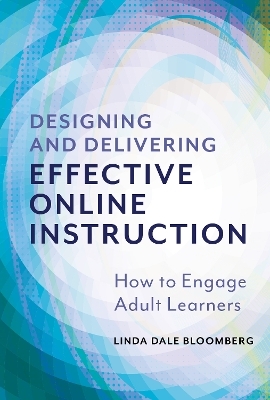
Designing and Delivering Effective Online Instruction
Teachers' College Press (Verlag)
978-0-8077-6528-9 (ISBN)
- Lieferbar (Termin unbekannt)
- Versandkostenfrei innerhalb Deutschlands
- Auch auf Rechnung
- Verfügbarkeit in der Filiale vor Ort prüfen
- Artikel merken
The Spring of 2020 saw educational institutions around the world abruptly convert to online teaching formats. While this transition may be unfamiliar—and even uncomfortable—the skills and techniques needed to engage and empower online learners can be learned and mastered to serve the current and ever-expanding need. This indispensable resource focuses on combining multimodal teaching strategies with innovative technology to help adult learners engage more meaningfully. The book distills decades of research in adult learning and education to provide evidence-based strategies that directly and practically apply to online environments. The author identifies five core areas for focus: principles of adult learning, engagement through presence, diversity and inclusion, community building, and enhancing learner empowerment; thereby demonstrating how to prepare for the online learning environment, design and deliver engaging course content, and effectively evaluate the learning experience.
Book Features:
A holistic approach that addresses and integrates every key dynamic to ensure the design, development, and delivery of optimal online learning experiences.
Appropriate for instructors and course designers as they manage blended or fully online teaching models.
Content is readily applicable across disciplines and institutional types.
Grounded firmly in research, theory, and best practices related to social presence, engagement, inclusive pedagogy, Understanding by Design (UBD), Universal Design for Learning (UDL), reflective practice, and principles of adult learning and development.
Comprehensive checklists provide overviews of key action items and associated steps involved in course design, development, and delivery.
Reflection is a cornerstone of deep learning, and reflective questions are included in each chapter.
Linda Dale Bloomberg has published extensively on online pedagogy, serves on online teaching advisory boards, and holds the positions of associate director of faculty support and development and full professor in the School of Education at National University. She is committed to developing materials that will ensure teaching excellence in the online environment. Read her posts on the TC Press blog: https://www.tcpress.com/blog/
Contents
Preface ix
Purpose and Function of This Book xi
Organization of This Book xv
What Sets This Book Apart? xviii
Additional Defining Features of This Book xxii
Introduction: Going the Distance—An Overview of Online Learning 1
The Landscape of Online Learning 1
The Role of the Online Instructor 7
Part I: The Art Of The Start—Design and Develop Online Instruction 13
1. Develop Course Learning Outcomes 17
Outcomes Are Aligned with Your Vision for the Course 18
Outcomes Are Sequenced 22
Outcomes Are Specific and Measurable 24
Course Content is Aligned with Outcomes 24
Chapter Summary and Synthesis 27
Reflection Checkpoint 27
2. Plan for Assessment of Learning 29
Assessment Instruments and Methods 30
Formative and Summative Assessment 35
Guidelines for Effective Assessment 37
Chapter Summary and Synthesis 39
Reflection Checkpoint 39
3. Create Course Content 41
Adult Learning Principles 42
The Multimedia Principle 44
Transforming Teaching Material into Audio and Video Content 51
Organization and Presentation of Material 53
Collaborative Learning Opportunities 58
Scaffolding 63
Inclusion, Equity, and Accessibility 65
Chapter Summary and Synthesis 72
Reflection Checkpoint 73
Part I Synthesis 75
Part II: Traveling The Educational Journey— Deliver Engaging and Empowering Learning Experiences 81
4. Onboard and Welcome Learners 85
Learner Engagement and Teaching Presence 85
Prepare for the Online Learning Experience 90
Strategies for Onboarding Engagement 91
Support Learners to be Successful 96
Strategies for Ongoing Supportive Engagement 99
Monitor and Address Progress and Development 103
Strategies for Effective Monitoring 103
Chapter Summary and Synthesis 104
Reflection Checkpoint 105
5. Establish and Build Teaching Relationships 107
Benefits of Positive Working Relationships 108
Develop Your Working Relationships 108
Engage Through Presence 110
Foster a Growth Academic Mindset 112
Power and Positionality 116
Chapter Summary and Synthesis 119
Reflection Checkpoint 120
6. Multimodal Teaching Strategies to Engage and Empower Learners 122
Respect Diversity and Strive for Inclusion 122
Culturally Responsive Teaching 123
Address Unequal Access to Technology 124
Develop a Learning Community 126
Facilitate Group Work and Collaboration 127
Feedback as the Medium of Instruction 130
Prepare to Provide Feedback 135
Guiding Principles for Substantive and Engaging Feedback 139
Multimodal Teaching 146
Assessment and Grading 151
Chapter Summary and Synthesis 153
Reflection Checkpoint 154
Part II Synthesis 157
Part III: Taking Stock—A Review of Multimodal Engagement 165
7. Revisiting Your Engagement Strategies 167
Engagement Indicators 167
Ensure Teaching Presence 170
Nurture Working Relationships 171
Apply Effective Facilitation Practices 174
Create a Sense of Community 176
Address Diversity and Inclusivity 178
Embrace Learner Autonomy and Empowerment 180
Support Learners’ Use of Technology 182
Establish and Maintain a Culture of Trust and Transparency 183
Chapter Summary and Synthesis 186
8. Instructor as Reflective Practitioner 187
Reflective Practice 187
Implicit Bias 189
Final Reflection 190
Glossary 193
References 216
Index 224
About the Author 234
Online Appendixes
Appendix A: Bloom’s Taxonomy
Appendix B: Accessibility Resources
Appendix C: Sample Welcome Letter
Appendix D: Learner Support Resource: How to Benefit from Feedback and Critique
Appendix E: Sample Learning Contract
Appendix F: Guidelines for Conducting Peer Review
Appendix G: Guidelines for Implementing Peer Dialogue Journals
Appendix H: Satisfactory Versus Unsatisfactory Written Feedback Samples
Appendix I: Samples of Feedback Commentary
Appendix J: Sample Grading Rubric
Appendix K: Sample Grade Justification Rubric
Appendix L: Engagement Evaluation Rubric
Appendix M: Annotated Research Resources: Engagement in Online Learning
Appendix N: Online Support Resources
Appendix O: Applications to Support and Enhance Online Teaching and Learning
| Erscheinungsdatum | 01.09.2021 |
|---|---|
| Verlagsort | New York |
| Sprache | englisch |
| Maße | 156 x 229 mm |
| Gewicht | 363 g |
| Themenwelt | Schulbuch / Wörterbuch ► Unterrichtsvorbereitung ► Unterrichts-Handreichungen |
| Sozialwissenschaften ► Pädagogik ► Erwachsenenbildung | |
| ISBN-10 | 0-8077-6528-7 / 0807765287 |
| ISBN-13 | 978-0-8077-6528-9 / 9780807765289 |
| Zustand | Neuware |
| Informationen gemäß Produktsicherheitsverordnung (GPSR) | |
| Haben Sie eine Frage zum Produkt? |
aus dem Bereich


